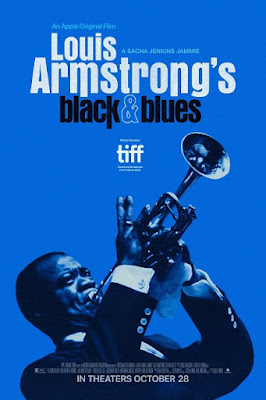Decades after his death, this jazz legend returned to the charts when his songs “What a Wonderful World” and “We Have All the Time in the World” were rediscovered. Both the modern conception of the jazz solo and scat singing come from him. For these and many more reasons, nobody is more iconic than Louis Armstrong, not even Elvis Presley or the Beatles. There have been Louis Armstrong documentaries before, but there is always room for another. Happily, director Sacha Jenkins does a nice job telling the jazz legend’s story throughout Louis Armstrong’s Black & Blues, which premieres tomorrow on Apple TV+.
Shrewdly, Black & Blues kicks-off with a performance of Armstrong’s “What Did I Do to Be so Black and Blue,” a hard-luck blues that is widely interpreted as a commentary on the racism Armstrong experienced. Jenkins definitely explores those themes, without over-emphasizing the metaphor, with respects to that particular tune.
The story of Armstrong’s life will be familiar to jazz fans, but Jenkins covers it well, giving viewers a vivid sense of his hardscrabble New Orleans upbringing, his apprenticeship under King Oliver, and his breakout fame in Chicago. Frankly, Black & Blues is surprisingly restrained when addressing Armstrong’s relationship with his longtime manager, Joe Glaser, who has been widely criticized as an exploiter by modern jazz historians.
Arguably, Jenkins’ handling of Armstrong’s good will tours for the State Department and his bitter criticism of Eisenhauer’s handling of the Arkansas school integration riots is more nuanced than that found in the documentary TheJazz Ambassadors, or the nonfiction book, Satchmo Blows Up the World that it was largely drawn from. Unlike previous sources, Jenkins suggests Eisenhauer was waiting for someone prominent to speak out against Faubus barricading schools, for some cover for Federal intervention (something I hadn’t heard suggested before). Armstrong was the only one who did, but he was criticized in the press by fellow celebrities, like Sammy Davis Jr.
Mostly, Jenkins’ talking heads are unseen, disembodied voices, whose commentary accompanies vintage video and photos, achieving a similar effect to the rediscovered taped voices narrating James Erskine’s Billie. However, Jenkins incorporates a long-ish archival video reminiscence from the late Ossie Davis (his co-star in A Man Called Adam) that really captures the poignancy of Armstrong’s struggles late in life.
Most importantly, Jenkins showcases plenty of Armstrong’s classic music. As an added bonus, Terence Blanchard (another New Orleans native) composed the sentimental but still swinging instrumental music heard briefly over the opening and closing credits. Fans might miss discussions of Paris Blues and “All the Time in the World” (recorded for On Her Majesty’s Secret Service), but just about all his other major career highs and lows are here. Highly recommended (just like Armstrong’s music), Louis Armstrong’s Black & Blues starts streaming tomorrow (10/28) on Apple TV+ and it also opens in New York at the Quad.

